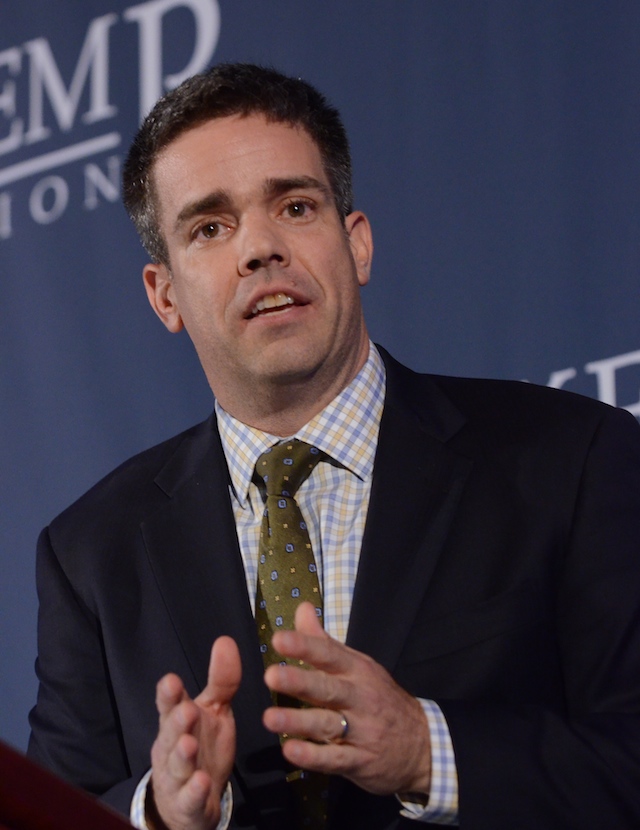by Georgia Center for Opportunity | Nov 5, 2014

Governor Nathan Deal
Georgia is receiving national attention as the state recently received four competitive federal grants from the Bureau of Justice Assistance (BJA) to implement its Prisoner Reentry Initiative (GA-PRI). Georgia is the only state to have received all four grants at one time – a testament to the smart framework that the state has developed to bring about significant reductions in recidivism.
The Governor’s Office of Transition, Support and Reentry (GOTSR) developed the GA-PRI Framework with the assistance of the Center for Justice Innovation last fall and began taking steps to implement it at five pilot sites around the state. GOTSR took these steps knowing that additional funding would be necessary to successfully carry out this initiative.
The office applied for the BJA grants around the beginning of summer with the hopes that it would receive the funding necessary to hire the right staff, provide evidence-based training and implementation, improve information sharing and measuring outcomes, and establish quality assurance mechanisms.
Jay Neal, executive director of GOTSR, explained that the office applied for the grants with the expectation that each one would fund a different component of the initiative and build on each other. This created a package deal that would enable the state to fully implement the GA-PRI framework without duplicating funds. This smart strategy appealed to BJA, who awarded the office each grant for which it applied.
The four grants that Georgia received for this initiative include:
| Smart Supervision Grant |
Department of Corrections; Governor’s Office of Transition, Support and Reentry |
$750,000 |
| Statewide Recidivism Reduction Grant |
Department of Corrections; Governor’s Office of Transition, Support and Reentry |
$3,000,000 |
| Justice Information Sharing Solutions Grant |
Criminal Justice Coordinating Council |
$498,234 |
| Justice Reinvestment: Maximizing State Reforms Grant |
Department of Corrections; Governor’s Office of Transition, Support and Reentry |
$1,750,000 |
Now that the state has received these grants, the next challenge will be to put all of its planning into action. This implementation phase will be critical to the success of prisoner reentry reform in Georgia, and the state understands that it will take collaboration among all stakeholders in the community for it to be successful, including businesses, churches, educational institutions, non-profits, and others.
GOTSR will be presenting its three year implementation strategy at the Justice Reinvestment National Summit in San Diego (November 17-19, 2014) where hundreds of people from over 30 states will be represented. These states will be looking at Georgia to see how well the state can implement its new reentry framework to reduce recidivism.
Georgia’s goal is to see a decrease in recidivism by seven percent in two years, and by 11 percent over five years.

Jay Neal, Executive Director of the Governor’s Office of Transition, Support and Reentry
The momentum for reform is strong right now in Georgia, but the true test of the state’s commitment to preparing citizens for successful reintegration will have to be seen in the coming years as the inevitable difficulties of implementation arise.
For now, the state’s leaders seem prepared to face those challenges as they arise. There is a prevailing optimism that can be heard in government boardrooms and local reentry coalitions around the state, especially as people recount the incredible progress that has been made in Georgia over the last four years in the area of criminal justice reform.
Image credit: The Atlanta Journal-Constitution (featured image), The Wall Street Journal, and The Polk Fish Wrap
by Georgia Center for Opportunity | Oct 28, 2014
GCO is thrilled to have Jeff and Jimmy Kemp join us at our annual fundraiser on December 4, 2014 at the College Football Hall of Fame in Atlanta. Jeff and Jimmy will be with us to share recollections of their father, the late Jack Kemp, and discuss why his legacy matters today. We will also show how GCO is working each and every day to make Georgia a state where ALL have a real chance to prosper. We look forward to you joining us on December 4, 2014. Register to Attend.
I believe the ultimate imperative for growth and opportunity is to advance human dignity. – Jack Kemp
JEFF KEMP

Jeff Kemp is a quarterback for the family. He is an Ivy League graduate who played eleven seasons as a Quarterback in the National Football League with the Los Angeles Rams, San Francisco Forty-Niners, Seattle Seahawks and the Philadelphia Eagles. Today he is more passionate than ever about strengthening marriages and families and bringing groups and teams together for exciting results.
In 2012, Jeff joined FamilyLife as a Vice President and Catalyst for helping others strengthen families. FamilyLife, based in Little Rock, AR. is a national ministry leader in resources to build and enrich marriages and families along with radio outreach, marriage conferences and other resources to heal and strengthen families. Prior to joining FamilyLife, Jeff founded and led a dynamic organization, named Stronger Families, in the Pacific Northwest from 1993-2010.
JIMMY KEMP

James Kemp (Jimmy) is President of the Jack Kemp Foundation. He is responsible for the creation of the Foundation and secured the donation of his father’s papers to the Library of Congress.
Jimmy serves as a Director of Strategic Business Initiatives at Squire Patton Boggs LLP. He co-founded Kemp Partners, a strategic consulting firm based in Washington, DC, assisting Fortune 500 companies as well as burgeoning firms before Congress, the White House and several federal agencies. He is also an Executive Vice President at Group 47.
Jimmy spent eight seasons as a quarterback in the Canadian Football League, finishing his career in 2001 with the Toronto Argonauts. He also serves as Chairman of the Board for the Hope Community Charter School located in northeast Washington, DC. The school serves 735 pre-K through 8th grade students and has been operating since September 2005.
by Georgia Center for Opportunity | Oct 28, 2014
Visit Duke and UNC Chapel Hill on 11/23/14 – 11/24/14 with Breakthrough Ambassadors. The tour is open to parents and 10th – 12th grade high school students.
Check out this fantastic opportunity through Breakthrough Ambassadors to visit UNC Chapel Hill and Duke for an overnight stay! 10th, 11th, and 12th graders from any high school and parents are all invited – Come and join us. This is a chance that comes to very few, so take advantage of viewing two of the South’s best schools.
COST: $75/person (includes transportation & hotel)
WHEN: Sunday, November 23rd – Depart 7 a.m.
through Monday, November 24th (college visits & return home – around 10:00 p.m.)
HOW: 55 passenger Charter Bus
COLLEGES: Duke University & the University of North Carolina (UNC) Chapel Hill
Space is limited. First come, first served.
Any questions? Contact prhsbreakthrough@gmail.com
Register Now
by Georgia Center for Opportunity | Oct 24, 2014

Employers have a responsibility to make sure the person they hire for a position is a right fit for the job. Background checks are one important part of this process, as they help to determine whether a particular industry or position is suitable for an applicant with a certain criminal history. However, it is vital that criminal records are used properly and not discriminatorily.[i] They should not be used as a screening tool to automatically dismiss all applicants with felony convictions. Rather, they should be used in a discerning manner, causing an employer to examine whether a person’s criminal history has any relation to the position sought. If there is a strong correlation, then there may be reasonable grounds to remove the applicant from consideration. If not, the applicant deserves the same chance as any person to demonstrate his or her qualifications for a job.
What does it mean to “ban the box”?
“Banning the box” refers to removing the question about a person’s criminal history from the initial job application and postponing the question to a later point in the hiring process. This policy increases the likelihood that a person with a criminal record will get hired by giving the applicant an opportunity to demonstrate his or her qualifications for a job without automatically being screened from the hiring process.
Postponing the question of an applicant’s criminal history to a later point in the hiring process allows applicants to explain their criminal record to an employer in person. This face-to-face interaction is essential to increasing an ex-offender’s chance of becoming employed. It provides an ex-offender the opportunity to be candid about his or her past and to explain how overcoming setbacks have fashioned him or her into a qualified candidate for the position. This conversation gives an employer the chance to listen to the ex-offender’s story, relate to him or her as a person, and get a better grasp of the person’s character and strengths. By giving ex-offenders the opportunity to represent themselves in the best light and to prove how qualified they are for a position, an employer may find his or her best candidate for the job.
Who is “banning the box”?
States, counties, and cities across the nation are establishing fair hiring polices for ex-offenders by “banning the box” on applications for public employment.
As of September 2014, thirty states have a local or state-level “ban the box” fair hiring policy for public employers. Among these states, thirteen have enacted statewide fair hiring laws, and six have also extended the fair chance policy to government contractors or private employers.[ii]
Nationwide, almost seventy cities and counties – including Atlanta and Fulton County – have taken steps to remove barriers to employment for qualified workers with records, and twenty of these cities and counties have extended “ban the box” policies to government contractors or private employers.[iii]
Why should Georgia “ban the box”?
Although the Governor spoke of “banning the box” earlier this year, he has not yet issued an executive order for state employers to do so. Taking this decisive step will be important for continuing the reforms his office has worked so hard to carry out this year to improve outcomes for returning citizens.
By following the precedent set by Atlanta and Fulton County and officially embracing “ban the box” policies for state employers, the state can help more people with criminal records get good jobs for which they qualify. This, in turn, will improve their chance of successfully reintegrating into society, decrease their chance of recidivating, enable them to benefit employers, and allow them to contribute to the economy of the state.
Embracing this policy at the state level will also encourage county, city, and even private employers across Georgia to follow suit.
For proof that “ban the box” policies help people with criminal records get good jobs and benefit employers, check out Durham, NC’s success story by clicking here.
This post was adapted from Georgia Center for Opportunity’s December 2013 report titled Increasing Employment Opportunities for Ex-Offenders.
Image credit: GT L&E Blog (featured image) and Accurate Background, Inc.
[i] U.S. Equal Employment Opportunity Commission, “Consideration of Arrest and Conviction Records in Employment Decisions Under Title VII of the Civil Rights Act of 1964,” Office of Legal Counsel, April 25, 2012, accessed November 29, 2013, http://www.eeoc.gov/laws/guidance/arrest_conviction.cfm.
[ii] National Employment Law Project, Ban the Box: U.S. Cities, Counties, and States Adopt Fair Hiring Policies to Reduce Unfair Barriers to Employment of People with Criminal Records, September 2014, ii, 3, http://www.nelp.org/page/-/SCLP/Ban-the-Box.Current.pdf?nocdn=1.
[iii] Ibid., 1-2.






